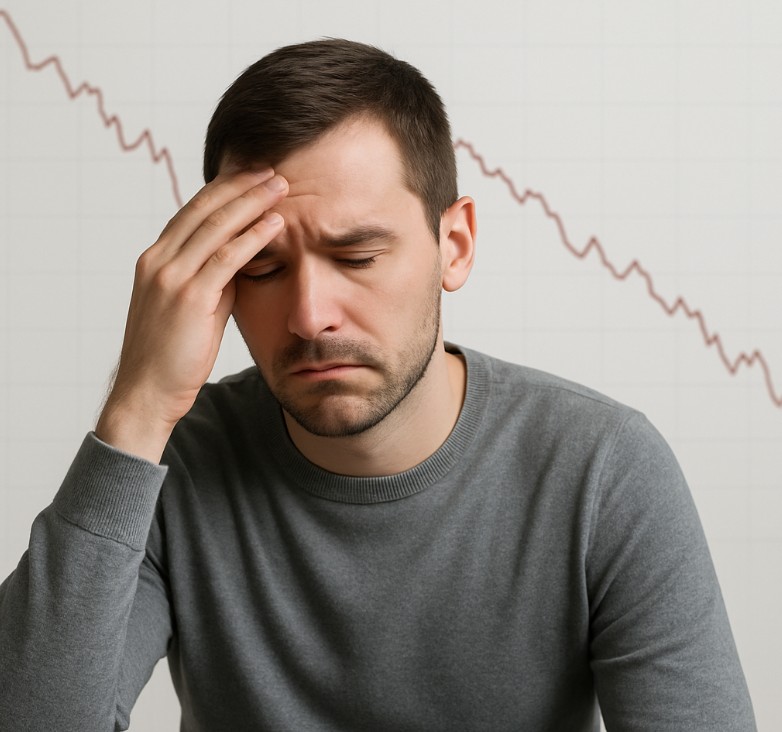Online trading can appear tempting due to its accessibility, flashy success stories, and the possibility of quick profits. However, many people end up losing money — often significantly — because they underestimate the risks and overestimate their knowledge. Here’s why:
Table of Contents
Why Online Trading Is Risky for Many People
1. Lack of Financial Knowledge
Most retail traders dive in without a solid understanding of:
- How markets work
- Risk management strategies
- Economic indicators or technical analysis
This leads to impulsive decisions based on rumors, hype, or emotion rather than logic.
2. High Volatility
Financial markets — especially forex, crypto, and derivatives — are highly volatile. Prices can swing dramatically in seconds, and without stop-loss mechanisms, traders can lose everything in one trade.
High volatility refers to large and rapid price movements in a financial market over a short period of time. In a highly volatile market, the prices of assets such as stocks, currencies, or cryptocurrencies can swing dramatically — both upward and downward — often without warning. These sudden changes are driven by factors like breaking news, economic data releases, global events, or investor panic and excitement. While volatility creates opportunities for quick gains, it also significantly increases the risk of sudden and substantial losses, especially for inexperienced traders.
For traders, high volatility can be both a friend and a foe. On one hand, it offers a chance to profit from big price swings; on the other hand, it can wipe out capital quickly if the market moves against a position. This is especially dangerous when combined with leverage, where a small unfavorable move can result in disproportionately large losses. Therefore, managing risk through stop-loss orders, smaller position sizes, and avoiding emotional decision-making is essential when trading in volatile markets.

3. Leverage Amplifies Losses
Many platforms offer leverage (e.g., 10x, 100x), allowing users to trade with more money than they have. While this multiplies potential profits, it also magnifies losses — often wiping out entire balances in minutes. Rethinking Wealth: Beyond Money – Learn Something New !
4. Overconfidence and Emotional Decisions
People often start with small wins, which lead to overconfidence, excessive risk-taking, and ignoring proper strategies. Losses trigger panic, leading to revenge trading or emotional decisions — a quick path to failure.
5. Scams and Unregulated Platforms
Scammers pose as trading “experts” or platforms. Fake apps, shady brokers, and Ponzi-style “investment groups” lure people in — and disappear with their money. 8 Recommendations to Avoid Scam Advertisements – Exceediance
6. Addictive Behavior
Trading can mimic gambling. The excitement of “winning” becomes addictive, leading people to chase losses or bet recklessly. One of the lesser-discussed but highly dangerous aspects of online trading is its addictive nature. Much like gambling, trading platforms are designed to offer instant feedback — profits, losses, real-time charts, flashing alerts — all of which stimulate the brain’s dopamine reward system. For some individuals, this leads to compulsive trading behavior where they feel the urge to “just place one more trade”, regardless of risk or logic.
This addiction can quickly spiral out of control, especially when paired with financial losses. Traders may try to “win back” lost money by increasing trade sizes or chasing high-risk opportunities — a behavior known as revenge trading. This emotional instability increases stress levels, anxiety, mood swings, and even depression, especially when losses start affecting personal finances and relationships. Over time, the psychological toll of compulsive trading can become as harmful as substance addiction, leading to burnout and emotional exhaustion. Managing screen time, taking mental breaks, and seeking professional support if needed are critical to staying emotionally healthy in the world of online trading.
7. Unrealistic Expectations
Social media is filled with influencers showing luxury lifestyles supposedly funded by trading. This builds false hope and encourages people to enter with dreams, not plans.
Scams and Unregulated Platforms: A Silent Trap for Traders
One of the most dangerous risks in online trading is falling prey to fraudulent platforms and unregulated brokers. These entities often pose as legitimate trading services but are actually designed to manipulate users and steal their money.
Fake Brokers and Platforms
- Many scam websites mimic the look and feel of real trading platforms to appear trustworthy.
- They lure users with promises of guaranteed returns, bonus credits, or VIP trading strategies.
- Once users deposit money, these platforms may refuse withdrawals, manipulate trade outcomes, or disappear entirely without notice.
Red Flags of Scams
- No clear licensing or regulation details from trusted authorities (like FCA, SEC, ASIC).
- Overly aggressive sales tactics or cold calls pushing you to deposit quickly.
- Poor website design with generic content, fake testimonials, or unverifiable trading data.
- Platforms that don’t allow you to withdraw your profits unless you deposit more — a common scam tactic.
Unregulated = No Protection
- Regulated platforms are monitored by financial authorities and must follow strict security, liquidity, and transparency rules.
- Unregulated ones operate in legal grey areas — often in offshore jurisdictions with zero accountability.
- If things go wrong (platform disappears, blocks your funds, or shuts down), you have no legal recourse or investor protection.
Fake Signal Providers and Trading “Experts”
- Some scammers don’t even run a platform — instead, they sell fake signal services, bots, or “mentorship programs” claiming 90–100% success rates.
- They may ask for access to your trading account or funds, which they misuse.
